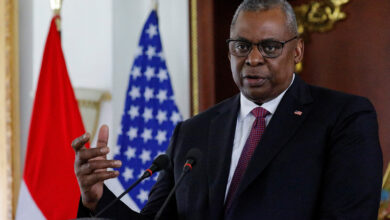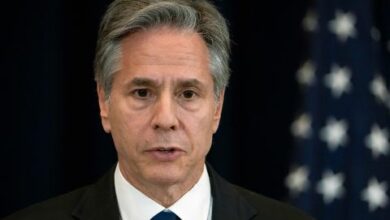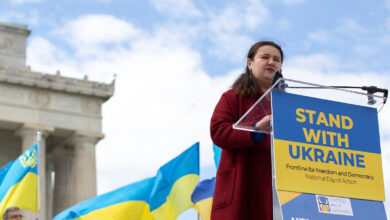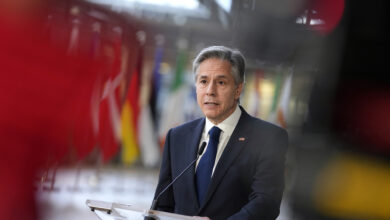Despite President Barack Obama’s recent assertion in his State of the Union address on Tuesday that the US “supports the democratic aspirations of all people,” experts say that Western reactions to recent civil unrest in Tunisia prove the West is not genuinely interested in promoting democracy in the Middle East.
“Events [in Tunisia] were quite embarrassing in terms of exposing western seriousness about democracy in the region,” said Dina Shehata from the Cairo-based Al-Ahram Center for Political and Strategic Studies. She pointed to the fact that the US had switched its stance on Tunisia only once “it became apparent that [Tunisian President Zine al-Abidin] Ben Ali was about to be deposed.”
Indeed, on 11 January, less than one month after Mohamed Bouazazi’s fateful decision to set himself on fire, Washington expressed its overt support for Tunisia’s government. In an interview with Al-Arabiya television network, US Secretary of State Hillary Clinton declared that Washington was “not taking sides” in the conflict between the government and protesters, stressing that Washington retained “a lot of very positive aspects of [its] relationship with Tunisia.”
Only two days later, on 13 January–one day before Ben Ali fled to Saudi Arabia–did the US begin to criticize Tunisia’s government, when US State Department spokesman Phillip Crowley labeled the “level of violence” in Tunisia “unacceptable.” That same day, Clinton delivered a stark warning to Arab regimes. “Those who stick to the status quo may be able to hold back the full impact of their countries' problems for a little while, but not forever," she was reported as saying to an audience of Arab dignitaries.
France, for its part, similarly supported Ben Ali until only moments before his demise, when French authorities refused to provide him with asylum in France. A few days before Ben Ali’s overthrow, foreign media outlets reported that the French Foreign Minister had offered to provide the Tunisian government French police expertise in "settling security situations of this type."
David Schenker of the Washington Institute for Middle East Policy points to a history of cooperation between the Ben Ali regime and the West. In an interview with Al-Masry Al-Youm, he pointed to cooperation in counter-terrorism during the George W. Bush years, when Bush praised the Ben Ali regime as a leading model in counter-terrorism.
Although the US has provided the Ben Ali regime with a modest amount of military aid over the years, Schenker credits the EU for fueling "Tunisia's economy through large cash infusions" and building a "robust trade relationship with the country."
Of all European countries, France in particular has maintained close ties with Tunisia. Over 1,200 French companies operate in the country, while over 22,000 French citizens live in Tunisia and some 600,000 Tunisians live in France. Tunisia represents a popular vacation spot for French tourists, while Paris Mayor Bertrand Delanoë–who was born in Tunisia–maintains a house there.
Despite the close relationship, once it became clear the Ben Ali regime would fall, the West needed to save face, Schenker and Shehata said. “Once he is overthrow, your calculations change. He’s no longer the president of that country and you have to take into account the future of your relations with the people of that country,” explained Shehata.
“It’s not politically wise to take in a dictator that was overthrown by his people,” she added, in reference to France's decision to refuse Ben Ali entry into the country.
The unrest in Tunisia was not the first recent instance in which western countries were perceived as having put strategic calculations before democratization.
“The Obama administration showed a lot more enthusiasm for the events in Iran than it did for events in Tunisia,” Shehata explained. It was only under pressure for being “slow to respond” that Obama began to “make more vocal statements of support,” Shehata said. At the time, media outlets suggested that Obama had initially refrained from openly supporting Iranian protesters because he feared antagonizing the Iranian regime at a time when he hoped to obtain Tehran’s cooperation in abandoning its nuclear program.
Some observers predict that the West will make more effort than it did in Tunisia to preserve the regimes of key Arab allies as their stability comes under threat from mounting popular unrest.
Senior researcher Shadi Hamadi of the Brookings Institute in Washington DC said that, in the end, Tunisia was “expendable,” while “Egypt and Jordan–Arab Pillars of the pro-American orbit–are less so.” Another key difference with Tunisia, Hamadi pointed out, is that Egypt and Jordan contain strong Islamist opposition groups whose potential rise to power would severely threaten US interests in the region.
“In general, the US interest is for the regime to remain essentially the same based on the logic that the devil they know is better than the devil they don’t,” Christopher Toensing, editor of the Middle East Report, was recently quoted as saying by the IPS news agency.
But Schenker refutes the notion that western countries can do much to prevent Tunisia-style unrest from overthrowing US-friendly regimes. “What should they do?” he asked in an interview with Al-Masry Al-Youm. “Send in troops?”
Schenker, along with another senior fellow at the Washington Institute, Scott Carpenter, criticized what they see as the Obama administration’s policy of putting stability before democratic reform. Schenker and Carpenter both dismissed the policy as misguided, writing that recent events in Tunisia had shown that the Obama administration’s perception of “a trade-off between stability and democratic reform is false.”
Schenker and Carpenter warned of the possibility that the mounting political turmoil could eventually lead to the toppling of other Arab regimes.
“What one perceives as stable can change within a matter of days,” they cautioned.




